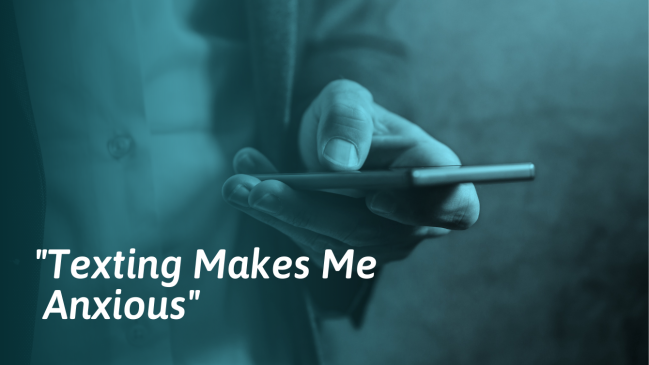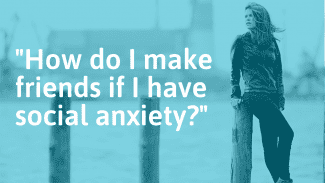While cell phones can make your life easier and more entertaining, they can also become a source of stress. According to an APA report in 2017, people who constantly checked their devices were more likely to report being stressed out.[1] Smartphones have also changed the way that people interact, with more people using texts as a way to stay in touch.
Getting a lot of texts throughout the day can be a major source of stress. You may feel scared to read your messages or pressured to respond right away. You might even have a phobia of replying to messages, overthinking your responses, or feeling like you don’t know what to say. Miscommunications are more common over texts because of typos, autocorrect, or misunderstanding what someone means.[2]
This article will provide tips to overcome texting anxiety and will teach you some text etiquette on when, how, and what to reply.
How to overcome texting anxiety
If you find texting produces a lot of stress and anxiety for you, consider trying some of the tips and strategies below. Depending on the situation (i.e., whether the text is urgent, who is texting, etc.), you can choose the response strategy that best fits the situation.
1. Don’t feel pressured to instantly respond
A lot of times, stress and anxiety around texting comes from the idea that every text requires an immediate response. In reality, most texts aren’t urgent, and it’s ok to wait to respond. While waiting more than 48 hours to respond to a question is considered rude, it is ok to wait a few hours or even a day to respond to non-urgent texts.[3]
Also, texting while driving, shopping, or on a date can lead to accidents, offend people, and lead to rushed responses. Instead, wait until you have a free moment to respond to people in a more thoughtful way.
2. Make use of auto-responses
Most smartphones have auto-responses you can use to respond to people who text or call you at inconvenient times. For example, if you turn on the “do not disturb” settings on an iPhone, it will allow you to auto-respond to texts. This setting defaults to a message that says, “I’m driving and will call you once I get where I’m going,” but you can change the message to something more general and use this setting while you are working or doing something else. This can make it less stressful to respond to texts that come in at inconvenient times.
3. Send short, simple responses or “likes”
Most smartphones have simple ways to respond to texts quickly with a “like” or emoji. For example, iPhones allow you to hold down on a text message and “react” to a message with a like, laugh, emphasis, or question mark without needing to write anything out. You could also just use a thumbs up, heart or smiley emoji to provide the same effect. Texting a simple, short response like, “Awesome!” or “Congrats!” can also be a great way to provide a feel-good response to a friend without overthinking it.[4]
4. Ask for someone to call you instead
If text messages just aren’t for you, it’s also ok to ask someone who texts you if they are free to talk on the phone instead. Conversations on the phone can be a lot more meaningful and provide information that can get lost in translation over text.
Being able to hear someone’s voice allows you to better read social cues that help you understand when they are joking, being serious, or really upset about something. In text messages, many of these cues can be hard to interpret and, according to research, cause many people to misinterpret what people say.[4, 5]
5. Don’t jump to negative conclusions
If someone “reads” a text or message but is taking a while to respond or responds with a one-word answer, don’t automatically assume it’s personal. It could be because they are busy, forgot to hit “Send,” because their phone is dead, or they have no service.
When you first start dating someone or are trying to make new friends, you may be more anxious about not hearing back right away. This can make you more likely to see signs of rejection, even when they aren’t there.
6. Ask for clarification
When you can’t shake the feeling that a certain text means someone is upset or angry with you, you can clarify by checking in with them. You could do this by sending a question mark to an unanswered text or by sending another text to ask if they are ok. Picking up the phone and calling them can also help you get a better read on what’s going on with them.[4] These are simple ways to check your assumptions and get more factual information to confirm whether or not they are upset with you.
7. Use emojis and exclamation points
If you have trouble knowing what to say over text or overthink your replies, your anxiety might be about not knowing how to respond to texts. One tip is to use emojis and exclamation points to help you convey meaning and a positive, friendly tone to your messages. Because you can’t use non-verbal cues like smiling, nodding, or laughing through text, these can be great ways to convey your emotions through texts.[4]
8. Explain delays and missed responses
If you forgot to text someone back or waited a day or two to respond, don’t assume that it’s too late to reach out, especially if it’s someone close to you. Remember that they may also struggle with texting anxiety and might be taking your silence personally. Instead, reach out by calling them or sending a text apologizing and explaining the delay, especially if it’s been more than 2 days.[3] This can help alleviate their anxiety and prevent any damage to your relationship with them.
9. Tell people if you just aren’t a “texter”
If you tend to be a chronic non-responder to texts, you might need to be upfront about this, especially with your close friends, family, or people you are dating. Explain to them that you just aren’t a big texter and provide a better way for them to get in touch with you when they need to. This will help you prevent damaging these relationships while also providing them with ways to stay in touch with you via email, phone calls, or social media.
10. Lower the volume of texts
Sometimes, the reason why you feel so overwhelmed and stressed out about text messages is that you are getting too many throughout the day. If you are getting constant texts throughout the day, it can feel impossible to keep up with all of them.
Here are some healthy ways to reduce stress caused by texts and other notifications:
- Ask your close friends, family, and colleagues to contact you in another way
- Opt-out of text notifications for companies, sales, and other alerts
- Remove yourself from group texts you don’t want to be in
- Silencing notifications for text messages (which can help to reduce interruptions)
A few tips on unwanted texts and messages
Increasingly, more people report receiving unwanted text messages, including some that include sexual, graphic, or explicit content. There are steps you can take to prevent this from happening and even to report people who are violating laws or rules.
If you are getting unwanted or inappropriate texts or messages, here are some ways to set boundaries:
1. Send a message back clearly stating that you do not want them to send you messages like these.
2. Tell the person to stop contacting you if they make you uncomfortable.
3. Block them on your phone and/or social media if they continue to message you.
4. Flag the content on social media if they are violating the platform’s policy or terms of use.
5. Consider contacting authorities for help. (i.e., your employer if it is a coworker, the police if you are experiencing online harassment, or use the NCMEC’s website to file a report of inappropriate images or videos of minors.)
Final thoughts
Text messaging can be an easy way to communicate with friends, family, and people at work, but it can also be stressful. Being constantly interrupted, feeling pressured to respond, and not knowing what to say can be frustrating, stressful, and can cause anxiety. By following the tips in this article, you can take some of the stress out of texting.
Common questions about stress and anxiety about texting
Why do text messages give me so much anxiety?
Your anxiety around texting is probably related to feeling the need to read, reply or send text messages as soon as possible. Unless a text is urgent, giving yourself permission to delay your response can take some of the pressure off.
Why am I so stressed by texting people?
If texting people stresses you out, it might be because you are overthinking your texts or placing too much importance on how you respond. Most texts aren’t urgent and don’t require perfectly worded responses.
Why am I more stressed about texting friends or people I’m dating?
If you get stressed when texting friends or people you are dating, it’s probably because these relationships are more personal. In personal relationships, the stakes for rejection feel higher, so it can mean you worry more about responding in the right way.
How do I stop being so anxious about texting?
Give yourself permission to not read, respond, and send texts right away if they aren’t urgent. Also, don’t overthink your responses, and make use of auto-reply, “like” and emoji features to give short, simple replies.
Why is texting so exhausting?
If you feel exhausted by texts, it may be because you are sending or receiving too many of them. By limiting the number of texts you get and giving shorter, simpler responses, texting can take less of your time and energy.









“Don’t jump to negative conclusions” is all very well to say, but how does one actually DO that? It’s like not thinking of a white rhinoceros.